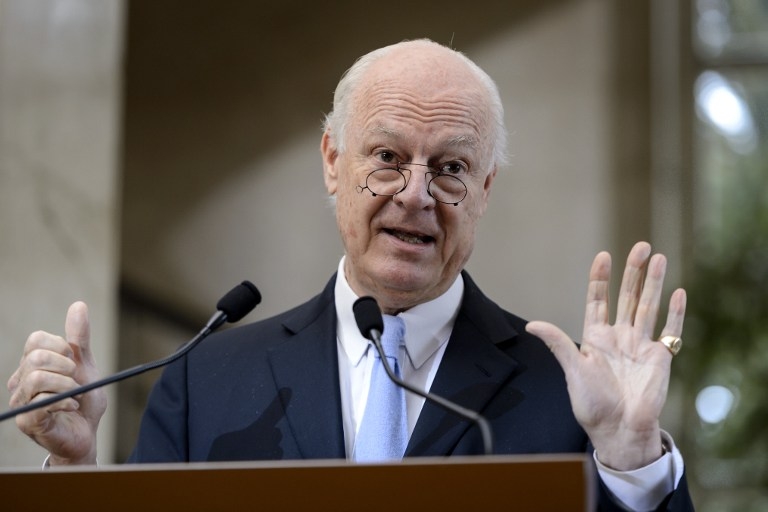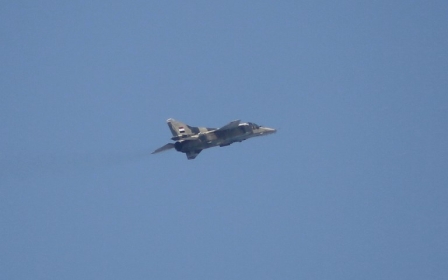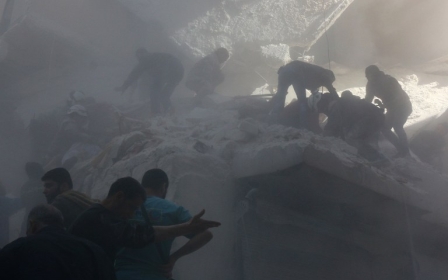Syrian peace talks set to begin with no agreed agenda

United Nations-brokered talks between the Syrian government and opposition groups are due to take place in Geneva on Monday with international backers hoping the negotiations could bring an end to the five-year conflict that has killed at least 270,000 people and displaced millions more.
But hours before negotiations were due to start, what would be discussed was still unclear, and Western powers hit out at the Syrian government for saying that removing President Bashar al-Assad would be a "red line".
US Secretary of State John Kerry said the remarks from his Syrian counterpart were "clearly trying to disrupt the process... [and] clearly trying to send a message of deterrence to others".
He urged the Syrian president's key ally Russia to bring Damascus into line, saying Assad was trying to "to take off the table something that [Russian President Vladimir] Putin and Iran had committed to".
"This is a moment of truth, a moment where all of us have to be responsible," he said.
French Foreign Minister Jean-Marc Ayrault went further, calling Syrian Foreign Minister Walid Muallem's comments a "provocation" and a "bad sign" in the peace efforts for Syria.
"There will be no political process if the opposition is not closely involved and confident," he added, calling on all the players in Syria's war to ensure "the peace process is sincere and real steps are taken".
While analysts say much has changed since the last round of indirect talks collapsed in February, Assad's fate and whether elections will be held within 18 months remain huge obstacles to agreeing a roadmap to peace.
A temporary ceasefire introduced on 27 February has largely held, despite accusations of violations from both sides, offering some reprieve for Syria's war-ravaged people and allowing aid to reach some 150,000 people living under siege.
But experts have cast doubt on whether the talks will get off the ground and, if they do, whether any agreement will be able to take hold on the fractured battlefields where multiple groups are competing for dominance.
Bassel Salloukh, political science professor at the Lebanese American University of Beirut, said the current talks were more of a forum for international powers involved in the conflict.
"The strategic interests of Russia and the US will determine the shape of the settlement in Syria rather than the aspirations of its peoples," he said.
Iran and Russia have been supporting Syria's government with weapons and air strikes, while the US, Europe, as well as Tehran's regional rival Saudi Arabia, have been backing the opposition.
"Asking the Syrian actors to agree has proven unsuccessful... because their ideological and territorial disagreements are so profound," says Joshua Landis, director of the Center for Middle East Studies at the University of Oklahoma.
"But all actors are so entirely dependent on their sponsors that they must comply with the wishes of their armourers."
Their leverage over warring parties in Syria has its limits, however, as half of Syrian territory is controlled by militants from the Islamic State (IS) group or the al-Qaeda affiliated al-Nusra Front.
Representatives from Syrian Kurdish groups will also not be part of the talks, despite support for their presence from Russia.
Syrian government negotiator Bashar al-Jaafari said on Sunday that he had held positive discussions with UN envoy Staffan de Mistura, but what would be discussed was still up in the air.
"We do not know what issues we will address or the agenda, which we still have not agreed on," he told media in Geneva.
The opposition High Negotiations Committee (HNC) on Sunday pledged to stick with the negotiations, but reiterated that any transitional body must be imbued with all executive powers.
"There will be no role within this body for those who have committed crimes, or for Bashar al-Assad," said HNC spokesman Salem al-Meslet.
New MEE newsletter: Jerusalem Dispatch
Sign up to get the latest insights and analysis on Israel-Palestine, alongside Turkey Unpacked and other MEE newsletters
Middle East Eye delivers independent and unrivalled coverage and analysis of the Middle East, North Africa and beyond. To learn more about republishing this content and the associated fees, please fill out this form. More about MEE can be found here.




